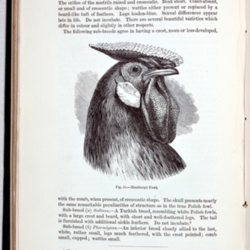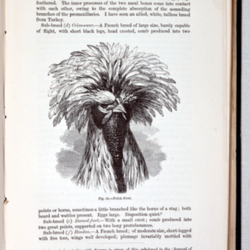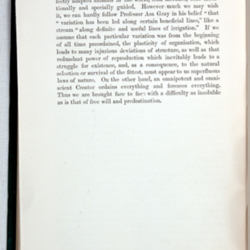Charles Darwin, The Variation of Animals and Plants under Domestication, 1868.
Charles Darwin. The Variation of Animals and Plants under Domestication. London: John Murray, 1868. 1st ed., 2d issue.
Darwin’s “big book,” which cost him “four years and two months hard labour,” revisits territory first covered in Origin of Species, the changes resulting from the human manipulation of animals and plants. Shown here is a particularly outrageous example of variation under domestication, the Polish fowl. Later in the volume, Darwin remarks that he has seen birds with such large crests that they were unable to pick up their food — which made them perfect bait for hawks. In a state of nature, these fowls wouldn’t be able to survive.
In the second volume, Darwin introduced his controversial theory of inheritance or “pangenesis,” a subject in which he had been interested for decades but which he kept mum about until he had time for a larger work. Inheritance involved the passing on, through eggs and sperms, pollen and ovules, of so-called gemmules, particles that encapsulated the nature of the organ, to the offspring, whose development they would then influence. Darwin ends the second volume by flatly contradicting his friend Asa Gray and his belief that “variations have been led along certain beneficial lines.” Remember the Polish hen prevented by its expansive crest from picking up the food it needs? Whoever doesn’t want to accept the existence of deviations that might not be equipped to survive the struggle for existence finds himself reverting to the notion of an “omnipotent God” who ordains everything. The conflict between such opposing views is, concludes Darwin, as “insoluble ... as that of free will and predestination.”
After the book trade had claimed the 1,500 copies Murray had printed for a January release, a second issue of 1,250 copies was published in February 1868. The first Russian translation of Variation appeared before the English original was published (the Russian translator worked off the page proofs) — the only work by Darwin to have been published in a foreign language prior to the English version (Freeman 123).






